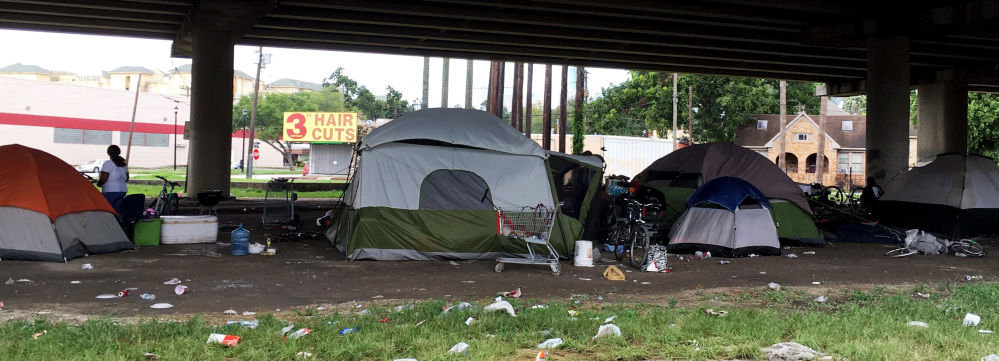HOUSTON — To the masses, it was a vicious blast of nature’s cruelty, a bruising brawl to survive, a forced trip to an uncertain future. To the few, it was just another miserable day.
For all the hardship and pain unleashed by Hurricane Harvey, many of Houston’s homeless shrugged it off.
“We ain’t got nothing to lose anyway,” said Eric Brian, one of the thousands of the city’s dispossessed.
Brian is 63 and is resting against a chain-link fence in midtown Houston, where he’s lived on the streets the past two years. He’s not interested in elaborating on the family problem that drove him here, and doesn’t think people care what happens to the homeless anyway. He says he never thought twice about seeking shelter even as the torrents came down.
A few blocks away, beneath an overpass for Interstate 59, about 20 tents are clustered with dozens of bikes, numerous charcoal grills, the occasional piece of furniture and mounds of trash. Many of the dozens who live here chose to brave Harvey in this place they call home, where pigeons gather to pick at food scraps and the steady hum and clacking of overhead traffic sounds.
Asked why he did not fear the storm, Billy Matthews, 46, points upward, to the concrete that shelters him. He began staying here two weeks ago, when he said he finished a yearlong prison stay for stealing Gucci sunglasses from a mall. For him, he said, Harvey was nothing.
“It’s just rain,” he said, echoing the words of others on the streets.
Some who live in the camp have phones or try to follow the news, but others rely entirely on the scraps of information passed along by their neighbors. They do not know whether to believe the stories they hear of how devastating the storm was; they know only that flooding in their camp was minor, leaving them on muddy ground.
The camp’s unofficial leader is Stanley Unc, 56. He too came here after time in jail, most recently for drunken driving. He says even if conditions were worse here, many wouldn’t have blinked – they are toughened by lives lived outside. He said others can’t grasp what their lives are like each day, much less on a day when a hurricane hits.
“They know what it took them through and we went right in the middle of it,” he said.
For those who work with those on the streets, the steely assessment of the storm by the homeless is not surprising.
“They experience a different world than people who are not in their circumstances,” said Joseph Cohen of the Salvation Army, which housed about 450 homeless people in its Houston facility. He said advocates are bracing for what may come next as waters further recede; help for the homeless, often hard to come by under normal circumstances, likely will be even more challenging in the storm’s aftermath. To many affected by Harvey, there is newfound loss. To the homeless, though, it may be more familiar.
“It’s heartbreaking every day,” Cohen said.
Some of Houston’s homeless did seek protection from the storm. The Coalition for the Homeless in Houston said its staff worked with partner organizations and the police department’s homeless outreach teams to direct people to shelter ahead of landfall.
Desiree DeMarco, 29, turned to Ben Taub Hospital for refuge. She suffers from mental conditions and had been seeing things and hearing voices as the storm approached. She works as a prostitute but hasn’t had a good customer lately. She said she didn’t even have enough money in her pockets for a soda and figured the hospital was the only place she could go.
“I needed to get out of the rain,” she said.
Earlier this year, an official count required by the U.S. Department of Housing and Urban Development found about 3,400 homeless people in Houston, an undercount of the problem in a city of 2.3 million but still the best official data available. Despite the uncertainty over the precise number of homeless people, there is general consensus there have been improving conditions over the past decade as locals undertook efforts aimed at getting people off the streets.
Nan Roman, president and CEO of the National Alliance to End Homelessness, said Houston will be “sorely tested” in the storm’s aftermath. “A lot of poor and vulnerable people who lost their homes will be at risk of homelessness because there will be less affordable housing to replace them,” she said.
Send questions/comments to the editors.



Comments are no longer available on this story